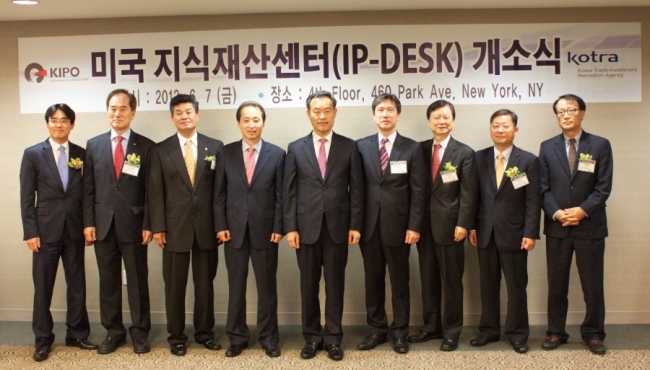 |
KIPO Commissioner Kim Young-min (center) poses with participants in the opening ceremony of a new Intellectual Property Desk, or IP-Desk, in New York on Friday. (KIPO) |
Amid the growing importance of intellectual property, the Korean Intellectual Property Office opened a special office in New York in an aim to help Korean companies respond to intellectual property protection issues overseas.
The KIPO, jointly with the Korea Trade-Investment Promotion Agency, held the opening ceremony of a new Intellectual Property Desk, or IP-Desk in New York on Friday.
Since 2006, the office has been running the IP-Desk system to provide Korean firms with intellectual property information and intellectual property protection strategies.
The New York office became the ninth in the series, following ones in Beijing, Shanghai, Guangzhou, Tsingtao, Shenyang, Ho Chi Minh City, Bangkok and Los Angeles.
Unlike the Asian branches, which tend to focus on anti-counterfeiting activities and cooperation with local governments, the U.S. offices are to place priority on offering information on strategy to protect intellectual property rights in compliance with U.S. laws, according to the KIPO.
“The New York office will act as an intellectual property gateway, offering a comprehensive package varying from information sharing and professional consulting sessions to technological transactions,” said a KIPO official.
“We are also considering expansion into developed areas such as Europe and Japan, where a majority of intellectual property suits are being filed against Korean companies.”
After the opening ceremony, the organization also hosted a briefing session on the protection of intellectual property in the overseas market.
“Korea used to be largely passive over the protection of intellectual property, especially against economic powers such as the United States,” said KIPO Commissioner Kim Young-min.
 |
KIPO Commissioner Kim Young-min speaks at the opening ceremony of IP-Desk in New York. (KIPO) |
“With the effectuation of the Korea-U.S. and Korea-EU trade pacts, however, Korea’s intellectual property system has made visible advancements over recent years.”
Kim also held an investment promotion session earlier in the day to present Korea’s patent system and the Creative Economy paradigm of the Park Geun-hye administration to foreign investors.
“With the transparent system and the creative economy paradigm of the new Park Geun-hye administration, Korea may become Asia’s intellectual property hub,” he said.
“For this, a steady flow of foreign direct investment is crucial.”
Kim advised companies, regardless of their size or category, take preventive measures and consult the IP-Desk in advance, before expanding into overseas markets.
“In most industries, especially in the digital sector, it is not just conglomerates and large companies but also small ones which are subject to intellectual disputes,” he said.
The KIPO chief also participated in the annual IP5 summit, which was held last week in the U.S. Silicon Valley. The top five countries in the intellectual property sector involve Korea, Japan, China, the European Union and the United States.
In this year’s meeting, the patent offices of the five participant states established a blueprint for the global dossier system and decided to provide patent information to the public with the marginal cost or free of charge. This will especially be of help to Korean companies, who have so far had difficulties accessing Chinese patent information despite the soaring number of patent approvals, officials said.
They also agreed to harmonize the different patent classification systems of each office.
By Bae Hyun-jung (
tellme@heraldcorp.com)









